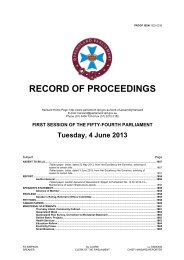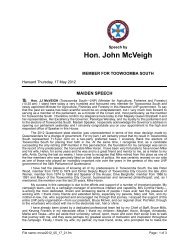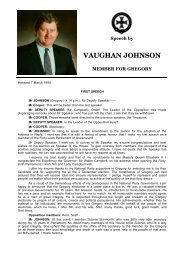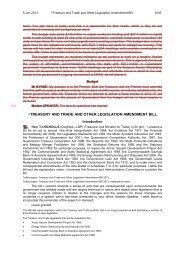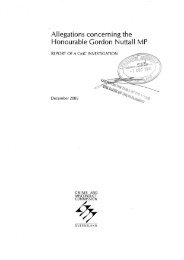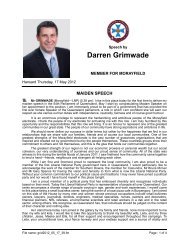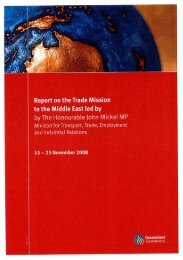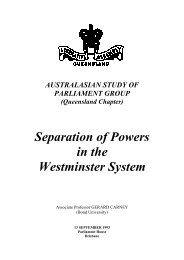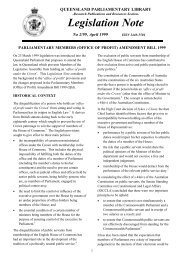weekly hansard - Queensland Parliament - Queensland Government
weekly hansard - Queensland Parliament - Queensland Government
weekly hansard - Queensland Parliament - Queensland Government
Create successful ePaper yourself
Turn your PDF publications into a flip-book with our unique Google optimized e-Paper software.
2578 Transport Legislation Amendment Bill 23 Aug 2005<br />
The bill will improve safety on our roads and at sea. It will reduce the pollution of <strong>Queensland</strong><br />
waters. It will enhance existing legislation to protect the most vulnerable in our society, and it will<br />
introduce minor changes to clarify or improve existing legislation. The acts to be amended are: the<br />
Transport Infrastructure Act 1994, the Transport Operations (Marine Pollution) Act 1995, the Transport<br />
Operations (Marine Safety) Act 1994, the Transport Operations (Passenger Transport) Act 1994, the<br />
Transport Operations (Road Use Management) Act 1995, the Transport Planning and Coordination Act<br />
1994, the Transport (South Bank Corporation Area Land) Act 1999, the Commission for Children and<br />
Young People and Child Guardian Act 2000, the Integrated Planning Act 1997, the South Bank<br />
Corporation Act 1989 and the Transport Infrastructure Act 1994.<br />
The Transport Infrastructure Act 1994 provides for the efficient management of transport<br />
infrastructure. The amendments to this act clarify or improve existing legislation. They do not change<br />
the intent of the legislation. In broad terms, the changes relate to tolling, port authorities, busways,<br />
miscellaneous transport infrastructure and non-rail corridor land. I will deal with each of these issues in<br />
turn.<br />
Tolling<br />
The new tolling provisions remove any doubt that gazetted toll charges only provide for the<br />
maximum that can be collected by toll operators and do not prevent a lower toll being collected. This<br />
does not reflect a change in policy. Occasions have arisen, and no doubt will continue to arise, where<br />
there are good reasons to impose less than the maximum amount in certain circumstances—for<br />
example, to encourage more people using toll roads off peak.<br />
I would like to make it clear that the amendment will not allow toll operators to collect tolls above<br />
the gazetted amount. It will only offer the operators the flexibility to collect amounts less than the<br />
toll amounts that are notified by gazette. The amendments will enhance the amenity and safety of road<br />
users. New South Wales has adopted a similar approach in its tolling legislation as it specifically<br />
provides that the amount of any toll may not exceed a prescribed amount.<br />
Port Authorities<br />
Let me turn to the changes in the bill dealing with port authorities. A port can be established as a<br />
body corporate under the Transport Infrastructure Act 1994 or as a government owned corporation.<br />
Currently, all ports are government owned corporations. However, when we amalgamated the<br />
Gladstone Port Authority and Rockhampton Port Authority last year to form the Central <strong>Queensland</strong><br />
Ports Authority, the assets and liabilities had to be transferred under both the Transport Infrastructure<br />
Act 1994 and the <strong>Government</strong> Owned Corporations Act 1993. The bill will clarify that TIA provisions for<br />
establishment and abolition of a port authority do not apply where a port authority is a government<br />
owned corporation. The only exception relates to the transfer of management of the port, which cannot<br />
be achieved under the <strong>Government</strong> Owned Corporations Act 1993.<br />
The bill will also remove any reference to specific port authorities in the definition of ‘port<br />
authority’. This will enable a port authority to be restructured or its name changed by regulation without<br />
the need for further amendment to the act.<br />
Busways<br />
The bill introduces a number of amendments relating to busways. One change will clarify that<br />
various types of land held by the state may be declared to be ‘busway land’. Currently land may be<br />
declared to be busway land only if it is acquired by the state or the chief executive for busway purposes<br />
or is a road. It is not clear that it includes other land already owned by the state. I seek leave to have the<br />
remainder of my second reading speech incorporated in Hansard.<br />
Leave granted.<br />
This amendment will clarify that a broader range of land can be declared busway land, including land that the State already holds<br />
for busway purposes, but originally acquired for purposes other than busway. The amendments also make provisions for common<br />
areas for busways and roads.<br />
Currently, the Transport Infrastructure (Busway) Regulation 2002 provides for the appointment and powers of busway safety<br />
officers. This Bill places these provisions in the Act as well as clarifying other powers of busway safety officers for general<br />
consistency with the powers of authorised persons in other transport legislation.<br />
The role of busway safety officers includes ensuring the orderly movement of people on the busway, managing busway traffic in<br />
accordance with speed limits, removing obstructions from the busway and generally ensuring the busway is safe for commuters<br />
and all other busway users. These powers are consistent with the powers of authorised persons but are restricted to the busway<br />
transport infrastructure and are generally more limited. For example, busway safety officers are not intended to have an<br />
enforcement role on buses and do not validate or check tickets like authorised persons.<br />
For those of you who use the busway, these are the men and women in green shirts with the red busway logo who attend busway<br />
stations and patrol the busway. They answer the help phones, assist distressed or worried passengers and keep an oversight on<br />
what is actually happening on the busway stations and busway.<br />
Busway safety officers can reach any point on the busway within five to ten minutes of a call or alarm.<br />
The amendments now ensure that busway safety officers have fundamental powers like authorised persons, to request name and<br />
address details of offenders, are protected from liability and include a specific offence for impersonating and obstructing a busway<br />
safety officer. To reflect current drafting, the provisions about busway safety officers are now included in the Act to ensure there is<br />
a clear legislative basis for their appointment and powers.



